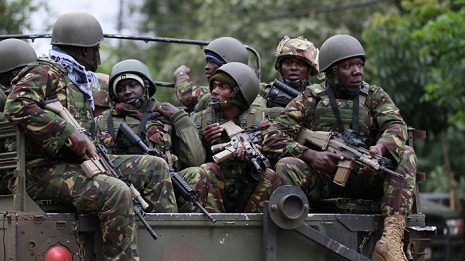Tremendous grief, pain, rising frustration and a palpable sense of dread were starting to seep across Kenya as a three-day period of mourning began and the students’ bodies slowly made their way back to towns and villages in nearly every corner of this country.
Accounts emerged Sunday that the police commandos who finally ended the siege of the university did not arrive until more than eight hours after the attack began because of logistical issues, raising questions about whether more young people could have been saved.
“Something has to change,” said an editorial in the Sunday Nation, a Kenyan newspaper. “Kenya must change from its Hakuna Matata posture” — “hakuna matata” is a common Swahili expression meaning “no problem” — “and realize that a war is afoot against a merciless enemy.”
Kenyan officials believe there were four gunmen who stormed Garissa University College on Thursday, moving from dorm to dorm, tricking students into coming out of their rooms and lying down in rows and then shooting them in the head. The Kenyan commandos, after waiting several hours to fly from Nairobi, the capital, to Garissa, a frontier town in eastern Kenya, cornered and killed all four gunmen, the authorities said.
One of the gunmen was identified as Abdirahim Abdullahi, approximately 25, the son of a local chief near the Somali border and considered by acquaintances to be exceptionally bright.
Mr. Abdullahi graduated from the University of Nairobi and worked at a bank in Nairobi, but he abruptly quit in recent months to join the Shabab Islamist militant group in Somalia, Kenyan officials said.
The Shabab are considered one of the most violent offshoots of Al Qaeda and vowed this weekend to make Kenyan cities “run red with blood” as retribution against the Kenyan government for sending troops into Somalia to help restore order.
Kenyan officials are increasingly worried that the Shabab have succeeded in co-opting disaffected youth inside Kenya, especially Somali-Kenyans like Mr. Abdullahi.
Outside of Somalia, Kenya sends more fighters to the Shabab than does any other country. Analysts say that many young Kenyan men have drawn payments of up to $1,000 to cross the border and hit the battlefield.
But ever since the Kenyan military stormed into southern Somalia in 2011, ousting the Shabab from some of their last strongholds, some Kenyan fighters may have drifted back. The fear is that Kenya, which has struggled with ordinary crime for decades, is now home to a growing network of trained jihadists.
On Saturday, in a televised address to the nation, President Uhuru Kenyatta said, “The planners and financiers of this brutality are deeply embedded in our communities.”
Yusuf Hassan, a member of Parliament representing Nairobi’s Eastleigh neighborhood, which is predominantly ethnic Somali, said all the recent terrorist attacks in Kenya, including a massacre in a coastal village last year, were carried out by Kenyan members of the Shabab.
Mr. Hassan said he feared that security forces would now crack down indiscriminately on Somali-Kenyans as they have in the past. Thousands of Somali-Kenyans and Somali refugees were rounded up last spring and detained in a stadium; several people were reported to have died, including a 6-month-old girl left in a crib for three days, by herself, after her mother was incarcerated.
“The Kenyan police are quite predictable,” Mr. Hassan said. “They seem to never learn from their past mistakes. The knee-jerk reaction will be to charge into Eastleigh and turn it upside down, and push up the anger and frustration level, leading to further alienation and radicalization.”
Eastleigh was watchful on Sunday. It was busy, as it usually is, with street vendors selling mounds of secondhand clothing, samosas, checkered scarves and plastic kitchenware spread out on plastic tarps. Residents said everything was normal — for now. But Ahmed Mohamed, a Somali-Kenyan businessman, said he had already seen the first wave of police trucks begin to prowl through the neighborhood.
“Last year was bad,” Mr. Mohamed said. “And it could happen again.”
Yusuf Hussein, 60, a legal refugee from Somalia, has been in Kenya for the past 12 years. A father of six, he said the police came to his house in Eastleigh last year — eight times — to verify his papers.
“We solved the problem,” Mr. Hussein said smiling, hinting that he had to bribe police officers.
According to human rights groups, many legal refugees and even Kenyan citizens with valid identification cards have had to pay bribes to get out of jail after they are detained by the police.
Mr. Mohamed, the businessman, organized a large demonstration on Friday to show that Somali-Kenyans were outraged about the attack at the university. He also had a message for the authorities.
“There should be intelligence-led operations,” he said. “If innocents get harassed and arrested, this will not help.”
More about:
















































